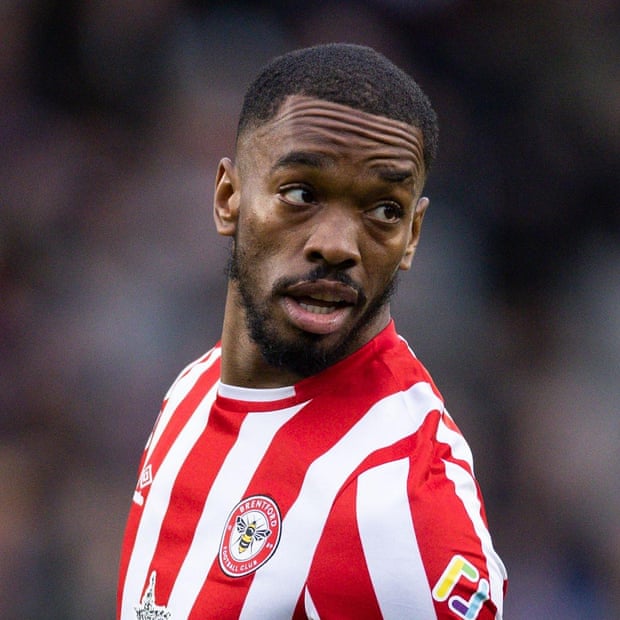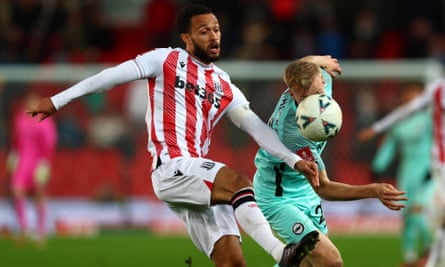Having owned up to multiple breaches of Football Association betting rules, the Brentford striker Ivan Toney faces a lengthy ban. The episode heralds a sad fall from grace for the talented 26-year-old, who might have made England’s World Cup squad had the shadow of the Football Association’s charges not been hanging over him.
It is right that Toney is sanctioned for breaking rules designed to protect the integrity of the game. But the powers-that-be in football can hardly clutch their pearls in horror at this turn of events having suckled hungrily at the gambling industry’s teat for so long.
The Big Step, a campaign group dedicated to removing gambling adverts from football, scented the whiff of hypocrisy neatly, posting a quartet of photos on Twitter. They show Toney, twice, proudly holding a SkyBet player of the month award, Toney in Brentford’s strip, emblazoned with the logo of Hollywood Bets, and Toney’s chest serving as a billboard for the Asian betting firm Fun88, during a stint at Newcastle.
For anyone who thinks Toney is old enough to resist the gambling imagery surrounding him, consider the case of Chris Rigg, who came off the Sunderland bench in the FA Cup tie against Shrewsbury wearing a shirt advertising Spreadex. Rigg is 15. The firm specialises in spread betting, which consistently rates among the most addictive gambling products in analysis conducted by the NHS. Football’s love affair with the bookmakers goes much deeper.
If Toney betting on football matches looks like a conflict of interest, what of the fact that bookmakers and gambling entrepreneurs own clubs outright? Stoke are owned by the Coates family via their Bet365 empire, while the Brighton chairman, Tony Bloom, built his fortune on the back of gambling businesses, including his specialist sports betting advice firm Starlizard. Meanwhile, one of Bloom’s former employees, Matthew Benham, developed statistical models to make smart sports bets and owns the gambling stats firm Smartodds and betting exchange Matchbook. As the Brentford owner he may now have to use his gambling riches to fund a stand-in for Toney.
The gambling-football nexus doesn’t end there, far from it. As the Guardian revealed last year, football clubs have been taking a cut of their fans’ losses for years, thanks to secret deals with gambling companies. More visibly, nearly half of Premier League clubs have front-of-shirt gambling sponsors, while rates are even higher in the Championship. Amid a much-delayed but wide‑ranging government review into gambling laws, top-flight clubs are expected to agree a voluntary ban on these deals soon. Yet pitchside ads – beamed into millions of homes every game – look likely to remain untouched.
Whether one agrees that the ads should go or not, forfeiting one form of in-game advertising but not the other is nonsensical. Yet such hoop-jumping would be just another symptom of football’s eagerness to bend to the will of the gambling companies, not to mention the broadcasters who profit from the industry’s marketing budgets.
Quick Guide
Ivan Toney ‘concerned’ about FA disciplinary process after ban speculation
Show

Brentford striker Ivan Toney says speculation relating to his impending disciplinary hearing on gambling-related charges has left him concerned about the process.
Toney is reported to be facing a ban of up to six months after being charged with a total of 262 breaches of the Football Association’s gambling laws that date back to 2017.
But Toney has hit out at the governing body over what he perceives to be potential lapses of confidentiality as he prepares to argue his case.
Toney wrote on his Instagram stories: “I was shocked and disappointed to see press speculation yesterday and today about the FA investigation process concerning me after I have been told by the FA that it is a confidential process until any decision has been made.
“It is especially disturbing for me to read that the FA is saying I shall be banned from football for six months before there has even been a hearing, and it does make me worried about the process.
“My lawyers will be writing to the FA to request that they conduct a leak inquiry as this is the second time stories have appeared in the newspapers – the last time was just before the selection of the England World Cup squad.
“As I continue to be told the investigation is mean to be confidential, I am unable to provide any further comment. I shall continue to concentrate on my football.” PA Media
Ever wondered why some games kick off at 8.15pm? Consider the voluntary “whistle to whistle” ban agreed by bookies, who promised not to advertise during matches before 9pm. The measure, brought in during 2019, meant that any matches starting at 8pm or earlier could no longer include half-time ad breaks featuring the likes of Ray Winstone demanding that punters “bet now” with Bet365. A coincidence, perhaps, that 2019 also ushered in the first 8.15pm kick-offs, allowing for the restoration of lucrative half-time advertising.
Those who listen to games on the radio don’t even have to wait for ad breaks. Commentators on TalkSport have been known to reel off odds during the match as part of commercial deals with the bookies. Little wonder, then, that some in the gambling industry see football as a cross between their personal plaything and a cash machine, at least according to a 2019 court case. In an email submitted as evidence, a broker involved in BetVictor’s deal to sponsor Liverpool’s training kit told the company: “You get to virtually own Liverpool Football Club” for an investment of £4.5m a year.
after newsletter promotion

All the while, gambling has continued to bring embarrassment to football’s door. Recent unsavoury episodes include Everton’s discomfort over its own deal with crypto-betting firm Stake.com, a Paddy Power stunt that backfired for Huddersfield Town, not to mention the whole sorry “Pie-gate” affair involving Sutton United’s goalkeeper.
Perhaps more seriously, one of the many managers who advertises for gambling companies, such as José Mourinho or Harry Redknapp, could easily field a competitive team from the list of players whose excessive gambling, or addiction, has made headlines. They include Wayne Rooney, Paul Merson, Andros Townsend, Steven Caulker and Matthew Etherington.
The football authorities have shown little appetite to loosen gambling’s grip. Yet, in the Toney affair, they presume to sit in judgment, wringing their hands over a player’s betting habits. It has echoes of the moment in Casablanca when Captain Renault, the hapless policeman, declares himself “shocked, shocked to find that gambling is going on in here”. A moment later, a croupier hands him a pile of money. “Your winnings, sir.”
Jackpot by Rob Davies (Guardian Faber, £10.99). To support The Guardian and Observer, order your copy at guardianbookshop.com. Delivery charges may apply.